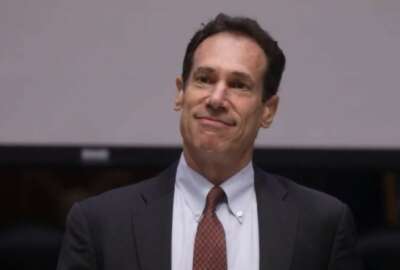

The National Whistleblower Center has urged federal agency heads to offer educational programming on National Whistleblower Day.
Best listening experience is on Chrome, Firefox or Safari. Subscribe to Federal Drive’s daily audio interviews on Apple Podcasts or PodcastOne.
A big holiday is coming up in July. It celebrates free people who don’t stay silent in the face of wrongdoing. No, not Independence Day July 4th. It’s National Whistleblower Day on July 30. Now the National Whistleblower Center has urged federal agency heads to offer educational programming about July 30. Federal Drive with Tom Temin got more from the chairman of the National Whistleblower Center and partner at Kohn, Kohn and Colapinto, Stephen Kohn.
Interview transcript:
Tom Temin: Mr. Kohn, good to have you back.
Stephen Kohn: Great to be here.
Tom Temin: And with this National Whistleblower Day, tell us more about that.
Stephen Kohn: Sure. So this day marks when the US Continental Congress on July 30 1778, passed America’s first whistleblower law to great law called upon every single citizen, or inhabitant in the United States to disclose violations of law to appropriate authorities. And it was, you know, before the US Constitution before the First Amendment, and it reflects a fundamental principle of American democracy unanimously understood by the founding fathers during the revolution. So when this was rediscovered, I did historical research. And we found this incident found the resolution since 2013. Every year the US Senate has passed a resolution urging all executive departments to acknowledge whistleblower day call attention to the contributions of whistleblowers, and really try to change the culture where whistleblowers are often demonized.
Tom Temin: Yes, I guess since that resolution, so many years ago, if you would consider whistleblowers as nails sticking up above the surface of the board, basically, we spend our time trying to hammer him back down in.
Stephen Kohn: Exactly. And what’s incredible about that, is when you go back to the history in 1778, the Continental Congress fully supported whistleblowers, who had disclosed misconduct against the commander of the US Navy. So this was an embarrassing situation, yet they didn’t hide from it. They released the documents. And what’s remarkable is that two of the whistleblowers were arrested on charges filed by the commander, and the Continental Congress voted to pay the attorneys fees of those whistleblowers, so they could win their case in Providence, Rhode Island. So they passed a resolution, they allocated money. And they did this during the American Revolution.
Tom Temin: So basically, the rebellion had rebels within the rebellion.
Stephen Kohn: Exactly. And they were reporting fraud. They were reporting this conduct. And what’s incredible when these allegations came to the Continental Congress, instead of just blocking them out, are declaring state secrets are saying we’re in the national emergency. They held a hearing, they took the evidence of the whistleblower, they then presented that evidence, and they called upon the commander to rebut it, he didn’t, they then removed the commander from his position. And then when the whistleblowers were retaliated against, they came to the defense of those whistleblowers. And then they passed this resolution, calling upon every inhabitant of the United States to report frauds and violations of law to appropriate authorities. And this is the foundation of freedom of speech in the United States.
Tom Temin: Yes, if you think about it, in some ways, it goes back to the idea of people not being undifferentiated subjects to a king or to some sort of potentate, but almost to the Magna Carta, in a sense that individuals do have rights to their personal sovereignty and their property.
Stephen Kohn: Absolutely. And when you read the letters and the correspondence and the testimony, what you see is that these whistleblowers, were relying upon what was known as the Common Law Constitution, which is just what you’re talking about the natural rights of all people to participate in civil society, which means you have to be able to expose wrongdoing. You can’t have freedom or the rule of law if the people can’t report violations. And that was really understood by these whistleblowers and the members of the Continental Congress that advocated on their behalf.
Tom Temin: We’re speaking with Stephen Kohn. He’s chairman of the National Whistleblower Center and a partner at the law firm Kohn Kohn and Colapinto. And since no more recent times, there have been whistleblower laws passed in our times, and just a couple of years ago, a Whistleblower Protection Enhancement Act, what’s your sense of how things are now? A couple of years after that enhancement, and when there’s so much whistleblower activity going on, either as a result of it or just because that’s the way things tend to happen in the federal government.
Stephen Kohn: In the federal government, for federal employees, things are still very bad. The Merit Systems Protection Board has been without a quorum for four years. And there’s a backlog of thousands of cases. So whistleblowers have been really out in the cold, federal whistleblowers, private sector have done better. And what’s incredible is the agencies that have implemented correctly, these new whistleblower laws now all support them, and they do publicly praise the whistleblower. And that is the key to the change in culture, the change in perception, we really won’t accept whistleblowers or really have a system in which people feel comfortable raising concerns, until the workplace culture shifts. And from our perspective, the key to that is for the leadership, not only to say whistleblowing is okay, but to point to examples, to point to what the Continental Congress did, and to educate their workforce and the American public that this is the American way, this is part of our credo, as free people.
Tom Temin: And getting back to your calls your organization’s call, for educational information to be presented in advance of the July 30 celebration day. What do you see as content and how it might be delivered?
Stephen Kohn: Well, it’s fascinating because, for example, the DNI celebrated Whistleblower Day, the same year that the Ukraine whistleblower came out, and they had information, they had meetings, information was put prominently on their web page. Other agencies have done the same, but they’re still the minority like the Office of Special Counsel. But you can see when an agency from the top explains not just that whistleblowing is lawful, but when they explain the contributions and the importance, and they tie that to the founding of the American republic itself, I believe that starts to create a change in attitude, not just within managers, but also within the employees.
Tom Temin: Stephen Kohn is chairman of the National Whistleblower Center and partner at the law firm Kohn, Kohn and Colapinto. Thanks so much for joining me.
Stephen Kohn: Thank you.
Tom Temin: And by the way, have you gotten any yes we’re gonna do this from any of the agencies that you have sent this request to?
Stephen Kohn: We’ll keep you updated on that. But we did get confirmations that Michael Horowitz, Inspector General of DOJ, and Henry Kerner, the head of the Office of Special Counsel, they will be speaking at our Whistleblower Day celebration, and we have other invitations out. So that’s been progress.
Copyright © 2025 Federal News Network. All rights reserved. This website is not intended for users located within the European Economic Area.
Tom Temin is host of the Federal Drive and has been providing insight on federal technology and management issues for more than 30 years.
Follow @tteminWFED


